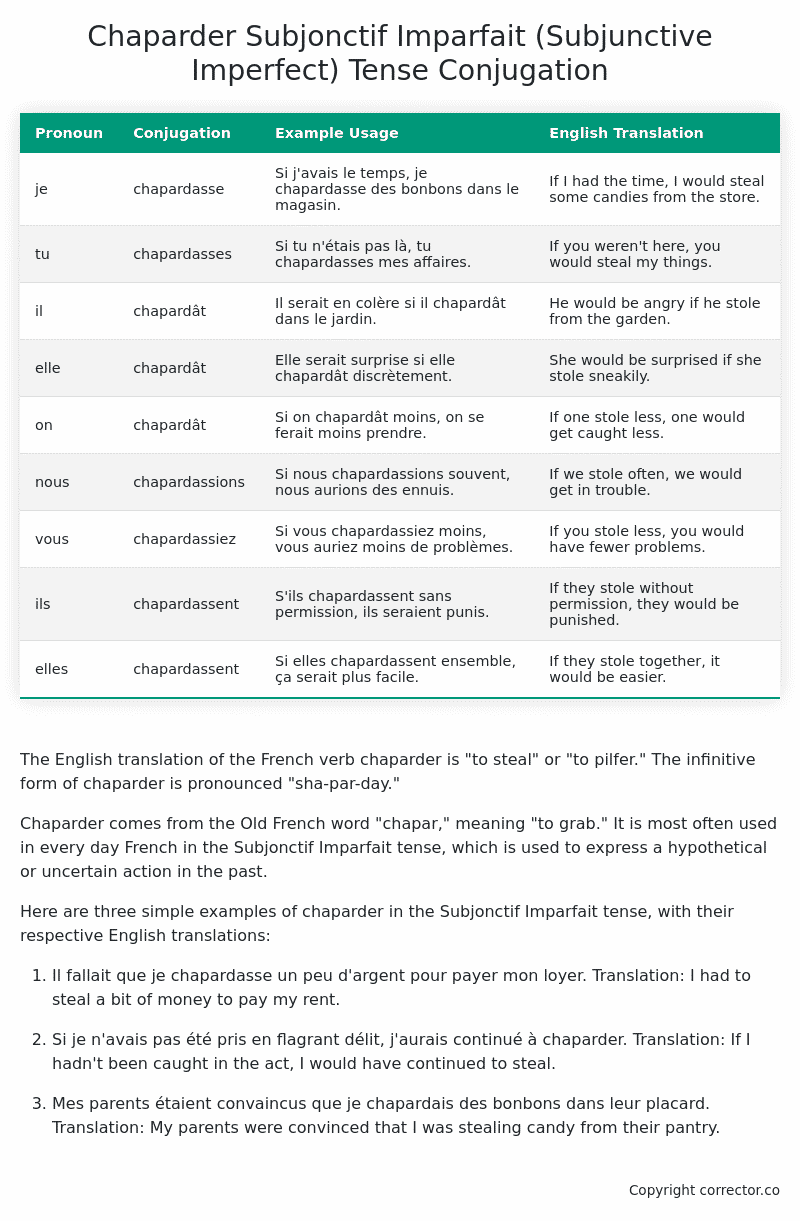Subjonctif Imparfait (Subjunctive Imperfect) Tense Conjugation of the French Verb chaparder
Introduction to the verb chaparder
The English translation of the French verb chaparder is “to steal” or “to pilfer.” The infinitive form of chaparder is pronounced “sha-par-day.”
Chaparder comes from the Old French word “chapar,” meaning “to grab.” It is most often used in every day French in the Subjonctif Imparfait tense, which is used to express a hypothetical or uncertain action in the past.
Here are three simple examples of chaparder in the Subjonctif Imparfait tense, with their respective English translations:
-
Il fallait que je chapardasse un peu d’argent pour payer mon loyer.
Translation: I had to steal a bit of money to pay my rent. -
Si je n’avais pas été pris en flagrant délit, j’aurais continué à chaparder.
Translation: If I hadn’t been caught in the act, I would have continued to steal. -
Mes parents étaient convaincus que je chapardais des bonbons dans leur placard.
Translation: My parents were convinced that I was stealing candy from their pantry.
Table of the Subjonctif Imparfait (Subjunctive Imperfect) Tense Conjugation of chaparder
| Pronoun | Conjugation | Example Usage | English Translation |
|---|---|---|---|
| je | chapardasse | Si j’avais le temps, je chapardasse des bonbons dans le magasin. | If I had the time, I would steal some candies from the store. |
| tu | chapardasses | Si tu n’étais pas là, tu chapardasses mes affaires. | If you weren’t here, you would steal my things. |
| il | chapardât | Il serait en colère si il chapardât dans le jardin. | He would be angry if he stole from the garden. |
| elle | chapardât | Elle serait surprise si elle chapardât discrètement. | She would be surprised if she stole sneakily. |
| on | chapardât | Si on chapardât moins, on se ferait moins prendre. | If one stole less, one would get caught less. |
| nous | chapardassions | Si nous chapardassions souvent, nous aurions des ennuis. | If we stole often, we would get in trouble. |
| vous | chapardassiez | Si vous chapardassiez moins, vous auriez moins de problèmes. | If you stole less, you would have fewer problems. |
| ils | chapardassent | S’ils chapardassent sans permission, ils seraient punis. | If they stole without permission, they would be punished. |
| elles | chapardassent | Si elles chapardassent ensemble, ça serait plus facile. | If they stole together, it would be easier. |
Other Conjugations for Chaparder.
Le Present (Present Tense) Conjugation of the French Verb chaparder
Imparfait (Imperfect) Tense Conjugation of the French Verb chaparder
Passé Simple (Simple Past) Tense Conjugation of the French Verb chaparder
Passé Composé (Present Perfect) Tense Conjugation of the French Verb chaparder
Futur Simple (Simple Future) Tense Conjugation of the French Verb chaparder
Futur Proche (Near Future) Tense Conjugation of the French Verb chaparder
Plus-que-parfait (Pluperfect) Tense Conjugation of the French Verb chaparder
Passé Antérieur (Past Anterior) Tense Conjugation of the French Verb chaparder
Futur Antérieur (Future Anterior) Tense Conjugation of the French Verb chaparder
Subjonctif Présent (Subjunctive Present) Tense Conjugation of the French Verb chaparder
Subjonctif Passé (Subjunctive Past) Tense Conjugation of the French Verb chaparder
Subjonctif Imparfait (Subjunctive Imperfect) Tense Conjugation of the French Verb chaparder (this article)
Subjonctif Plus-que-parfait (Subjunctive Pluperfect) Tense Conjugation of the French Verb chaparder
Conditionnel Présent (Conditional Present) Tense Conjugation of the French Verb chaparder
Conditionnel Passé (Conditional Past) Tense Conjugation of the French Verb chaparder
L’impératif Présent (Imperative Present) Tense Conjugation of the French Verb chaparder
L’infinitif Présent (Infinitive Present) Tense Conjugation of the French Verb chaparder
Struggling with French verbs or the language in general? Why not use our free French Grammar Checker – no registration required!
Get a FREE Download Study Sheet of this Conjugation 🔥
Simply right click the image below, click “save image” and get your free reference for the chaparder Subjonctif Imparfait tense conjugation!

Chaparder – About the French Subjonctif Imparfait (Subjunctive Imperfect) Tense
Formation
Common Everyday Usage Patterns
Interactions with Other Tenses
Subjonctif Présent
Indicatif Passé Composé
Conditional
Conditional Perfect
Summary
I hope you enjoyed this article on the verb chaparder. Still in a learning mood? Check out another TOTALLY random French verb conjugation!


